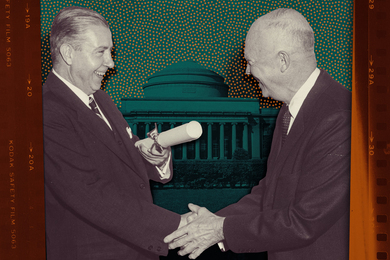(From time to time, MIT Tech Talk will publish opinion pieces by members of the MIT community.)
What does it take for an 18-year-old, or anyone else for that matter, to keep from misusing alcohol or other drugs -- and endangering himself/herself and others -- while drinking or drugging? We could start instead with a question largely absent from the Institute's discussion to date: Why do people drink alcohol? Hint: it's not because they are thirsty.
If I drink alcohol to relax and allay feelings of stress or insecurity in a social situation, if I know and set a reasonable limit for my drinking, and if my friends do not push me to go beyond that limit, I will probably not get into any problems -- or create any for anyone else. If I do not drink, I still experience the same uncertainties and insecurities as anyone else. I may suffer the added burden of unwelcome invitations to "just have one." I may even be ridiculed for abstaining.
What does it take to change misuse of alcohol? Like the lightbulb that the psychiatrist can change "only if it wants to change," all of us have to want to change our standards, our language and our personal behaviors regarding alcohol use and sobriety. Housing policy has dominated our discussions at MIT. But Scott Krueger didn't die from housing, he died from drinking that began as social drinking.
Community standards define social drinking. One of the problems at MIT and many other colleges is that we consider excessive drinking to be socially acceptable. Take, for example, this appalling advertisement in The Tech in September and October 1996: "Take The Worry Out of Partying," the Salomon's Sneaker ad read. "Vomit-Resistant Uppers! Contagrip Sole Offers Unparalleled Handling on Beer Soaked Surfaces!" Hmm -- perhaps promotions of this sort should be declined.
Recently I overheard a visiting scientist laughingly remark to a member of President Vest's Committee on Prevention of Binge Drinking, "Well, are you going to do any experiments?" Several years ago, I heard a dean refer to a fraternity as "I Tappa Keg." I hope he has stopped using that phrase. The joking and winking need to end.
Have you ever wondered what recovery from substance abuse and obsessive or violent relationships is like? The MIT Libraries Reserve Room (14N-132) has an "Addictions Awareness" shelf with "The Big Book" of Alcoholics Anonymous, several publications from Al-Anon, other groups and programs that support sobriety, a list of recovery groups meeting locally, a reading list, and the current issue of Advances, which describes current groundbreaking research in efforts to prevent incidents related to alcohol and other drugs.
Alcohol is by far the most frequently abused drug throughout society and on campus. But there is little evidence so far that MIT's community standards on alcohol consumption are changing. Alcohol-related incidents continue to occur and the President's Committee has been largely quiet.
What else can we do? Attend an IAP event on the topic. There are two: "Drug Education for Real Life," on Sunday, Jan. 18 from 4-6pm in Rm 1-150, and "Substance Use and Abuse" on Tuesday, Jan. 27 from 3:30-5pm in Rm 1-190. Fill the meeting rooms. Broadcast the programs live on public video monitors. Tape them for the Health Education library and for rebroadcast. Have raffle drawings for attendees. Use some of the energies that went into the successful Infinite Buffet (if there are any left!) to make these into magnet events.
Perhaps the Safety Office could include in its required presentations for staff, faculty and students a 20-minute session on "How to avoid problems with alcohol" and, just as important, "How to intervene effectively with someone who has a problem with alcohol."
Sobriety, according to the dictionary, is "solemnity" or "absence of alcoholic intoxication." We need to learn how to foster sobriety as defined by people recovering from problem drinking. In recovery, sobriety is based on serenity that helps manage feelings: insecurity, frustration, boredom (the little three); anger, fear and sadness (the big three); and joy (the big one). In recovery, sobriety implies also a willingness to help friends and loved ones manage strong feelings honestly and positively.
"Binge Nights," the cover story about the University of Virginia and other colleges in the January 4 New York Times supplement Education Life, shows that we are not alone in our suffering. MIT's powers that be, and all of us, as members of the Institute community, can take a searching and fearless look at the reality of our community standards, and then make a new map and start down a path toward more effective support for sobriety.
Eve Sullivan, annals@mit.edu, is a senior editorial assistant at MIT. She welcomes your comments.
A version of this article appeared in MIT Tech Talk on January 14, 1998.





